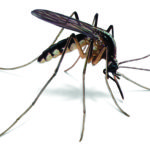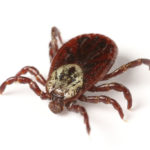Spring rains combined with warm weather make conditions favorable for mosquito breeding. Mosquitoes can breed in any standing water if it lasts at least seven days.
“Our main focus of our Mosquito Control Program at Richland Public Health is to reduce the risk of mosquito-borne disease,” Joe Harrod, Director of Environmental Health, said.
 Some species of mosquitoes bite during the day while others bite at dusk and dawn. Therefore it is always important to protect yourself from being bitten. Below are some tips to avoid mosquito bites and prevent mosquito-borne diseases:
Some species of mosquitoes bite during the day while others bite at dusk and dawn. Therefore it is always important to protect yourself from being bitten. Below are some tips to avoid mosquito bites and prevent mosquito-borne diseases:
- If you are outdoors when mosquitoes are most active, be sure to wear long pants, a long-sleeved shirt, shoes, and socks.
- Wear light-colored clothing, which is less attractive to mosquitoes.
- Use EPA-registered mosquito repellent and apply according to label directions. For a list of approved repellents and tips for their use, click here: https://www.healthychildren.org/English/safety-prevention/at-play/Pages/Insect-Repellents.aspx
- Wear clothing and gear treated with repellant.
- Install or repair screens on windows and doors to keep mosquitoes out of your home.
Richland Public Health officials are encouraging all Richland County residents to take precautions to protect yourself and your family by eliminating mosquito breeding sites near your home:
- Recycle all unused tires or make sure they are not holding water. Each tire can become a breeding area for thousands of mosquitoes.
- Eliminate all water-holding containers, such as tin cans and unused flower pots, from your property.
- Eliminate or drain water features or areas on your property where standing water lasts more than seven (7) days.
- Make sure all roof gutters are clean and drain properly.
- Clean and chlorinate pools, outdoor saunas and hot tubs. Keep them empty when not in use and drain water from pool covers.
- Change water in birdbaths weekly.
- Change water in kiddie pools regularly and eliminate standing water that collects around the edges of the pools.
Richland Public Health conducts mosquito trapping and surveillance to know what areas are experiencing increased exposure and to identify the types of mosquitoes present. In addition to trapping and surveillance, Richland Public Health conducts mosquito spraying, weather-permitting. During the active mosquito season, those sprayings events are posted on the Richland Public Health website, Facebook and Twitter.
 Along with mosquitoes, Richland Public Health encourages residents to be aware of ticks. Ticks are a health concern as they can transmit a variety of diseases including, but not limited to, Lyme disease. There were 293 cases of Lyme disease in Ohio last year, a two-fold increase in just four years.
Along with mosquitoes, Richland Public Health encourages residents to be aware of ticks. Ticks are a health concern as they can transmit a variety of diseases including, but not limited to, Lyme disease. There were 293 cases of Lyme disease in Ohio last year, a two-fold increase in just four years.
Lyme disease symptoms include fever, headache, fatigue and a characteristic skin rash called a “bull’s eye” rash. Lyme disease can be treated successfully with antibiotics. If left untreated, the infection can spread to the joints, heart and nervous system causing life-long health complications.
“Residents need to be particularly cautious and check for ticks on themselves or their clothing when returning from being in brush or forested areas,” said Harrod. “People who have cats and dogs that go outside need to check their pets for ticks when they return inside the house.”
Information on ticks and the various diseases they can spread is available on the Richland Public Health website, www.richlandhealth.org. There you can learn how to identify, prevent, and safely remove ticks.
See the pages for both mosquitoes and ticks under the Community listing in the “Find A Service” menu on the main page.
- Mosquitos: https://richlandhealth.org/our-community/mosquitoes/
- Ticks: https://richlandhealth.org/our-community/ticks/
For additional information about mosquitoes and ticks, see the following websites at the Ohio Department of Health (ODH):
- West Nile virus: https://odh.ohio.gov/wps/portal/gov/odh/know-our-programs/zoonotic-disease-program/resources/west-nile-virus
- LaCrosse virus: https://odh.ohio.gov/wps/portal/gov/odh/know-our-programs/zoonotic-disease-program/resources/lacrosse-virus
- Lyme Disease: https://odh.ohio.gov/wps/portal/gov/odh/know-our-programs/zoonotic-disease-program/resources/lyme-disease
Individuals who are traveling in Zika virus infected areas should strictly follow steps to prevent mosquito bites and seek immediate medical attention if sick after traveling. For further information, please visit the Zika virus link on our website. Zika virus information is regularly updated on our website with information provided by the Center for Disease Control and Prevention (CDC).
- Zika Virus Information at the CDC: https://www.cdc.gov/zika/

